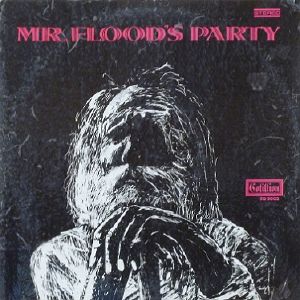
- Format: FLAC

As one of the last truly great psychedelic albums of the 1960s, the eponymous debut (and only) LP by Mr. Flood's Party remains an exquisite listening experience more than 40 years after its was unleashed upon a generally unresponsive record-buying public. Although its intermingling of various musical styles in an experimental fashion was no longer a novelty by this point in the decade, it achieves a grandeur that few other contemporary releases achieve due largely to the group's considerable vocal and instrumental talents. There were still a lot of great mind-expanding records coming out in 1969 even if psychedelia was approaching the end of its commercial rope, and Mr. Flood's Party definitely qualifies as one of them.
An aura of obscurity continues to surround the group due to a scarcity of information about them, a somewhat surprising situation considering that they were signed to major-label Atlantic subsidiary Cotillion and apparently hailed from Long Island in New York. The personnel consisted of Tom Castagnaro, Michael Corbett, Jay Hirsch, Rick Mirage, Marcel Thompsen, and Freddy Toscano, although I cannot locate much in the way of details about what instruments they played. A Myspace page (remember those?) respectively identifies Catagnaro and the Dutch-born Thompsen as a drummer and guitarist and describes some of the other members (the "two 'Principal's'" [sic]) as college professors! Corbett and Hirsch (the rocking academicians?) probably handled a significant amount of the vocals since they would later record an album with guitarist Hugh McCracken on which their singing has been favorably compared with Crosby, Stills, Nash, & Young. According to one source, Toscano subsequently functioned as a singer, guitarist, and keyboardist in the little-known mid-1970s band Frogs, and it is quite possible that he served in the same capacity with Mr. Flood's Party. While these two aforementioned offshoots have their musical virtues, neither of them bear much of a resemblance to the band that recorded the subject of this review.
MR. FLOOD'S PARTY, 1969 - L TO R: ? , ?, MARCEL THOMPSEN, ?,
TOM CASTAGNARO, & ? (CAN ANYONE IDENTIFY THE OTHER GUYS?)
So what does Mr. Flood's Party sound like? As with quite a few albums recorded circa 1966-1969, it is a very eclectic affair and displays a great number of influences including guitar-intensive West Coast psych, orchestrated baroque rock, and harmony-vocal-heavy British Invasion groups to name but a few. The record boasts impressive production standards as well as effects supplied by what sounds like a Moog or Mellotron synthesizer and a Leslie amplifier, while the songs range from delightfully weird hard rock tunes to exquisitely crafted exercises in mind expansion. Even though some critics claim that an overabundance of musical variety prevented Mr. Flood's Party from establishing a concrete musical identity as a band, I beg to differ and believe that their lone effort should be recognized as a challenging and multilayered work that will reward the listener with repeated spins on his or her turntable. Not that I necessarily advocate such things, but indulging in some mind-altering drugs will probably make this record even easier to appreciate. A discernible feeling of sadness pervades much of the album, which should not come as a surprise since the group's name is derived from "Mr. Flood's Party," a piece by the notedly gloomy American poet Edwin Arlington Robinson. (I assume the cover artwork depicts the drunken old sod Mr. Flood himself.) That's not to suggest that Mr. Flood's Party the LP should be considered a tearjerker, although it's certainly an introspective listening experience since the songs explore much of the same thematic territory as Robinson's works. Some of the tracks have an engaging schizophrenic quality to them, in particular "Northern Travel" (an LSD metaphor?) and "Deja Vu," which sound as if they were constructed from several different songs and glued together with psychedelic paste. Wailing lead guitar, soaring strings, and heavenly vocals grace "Advice," while "Prince of Darkness" finds the band sounding somewhat like an East Coast equivalent to the West Coast Pop Art Experimental Band to my ears. The delicate but not overly-precious "Simon J. Stone" features more gorgeous harmony singing in addition to lyrics that could pass for one of Robinson's own poems. The Moog showcase "Stanley's Tea" finds Mr. Flood's Party at their most Anglophonic, while "The Liquid Invasion," with its searing lead guitar work, is just as psychedelic as its title implies. The dreamy "Garden of the Queen" returns the band to British-inspired material and intentionally or not comes off as something resembling psych folk. "Mind Circus," the complex closing track, can best be described as a musical interpretation of someone's descent into madness, concluding with a haunting fadeout that will stay with you for days.